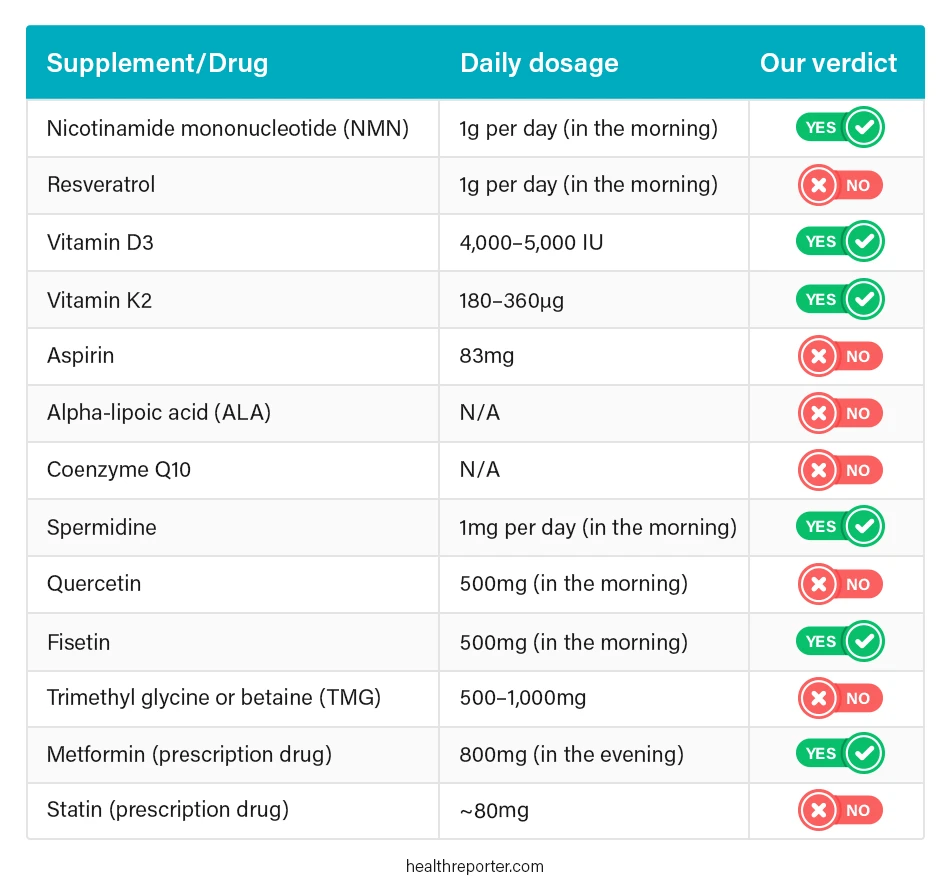How do we vet brands and products? Learn more.
David Sinclair Supplements: Doses, Benefits, and Insights
Can aging be stopped in its tracks? The answer may be yes, thanks to research conducted by biologist David Sinclair.
As we age, most people begin noticing gray hairs, wrinkles, and new pains in their joints and bones – but not Dr. David Sinclair.
The aging and longevity scientist believes that it’s possible to live until the ripe old age of 150 by simply developing the right supplement and prescription drug regimen.
This leads us to the most commonly asked question about Sinclair: What are his anti-aging secrets?
To provide the answer, we’ve looked closely at the supplements he consumes to help delay the signs of aging. We explain our verdict on their effectiveness and explore how you can implement them into your routine to reap all their benefits.
Dr. David Sinclair Currently Takes These Supplements
#1 NMN
#2 Resveratrol
#3 Vitamin D3
#4 Vitamin K2
#5 Low-dose aspirin
#6 Alpha lipoic acid
#7 Coenzyme Q10
#8 Spermidine
#9 Quercetin and fisetin
#10 TMG
#11 Metformin
#12 Statin
David Sinclair Supplements: What Is He Using Daily?
As a natural phenomenon that happens to us all, the aging process can be summarized by 12 distinct characteristics, which are referred to as the hallmarks of aging. This includes everything from chronic inflammation to dysbiosis, which occurs when our gut microbiome becomes unbalanced.
However, there are interventions that we can make to prevent and treat these hallmarks, hence lengthening our life span. Known as “reverse aging,” this is a relatively new field of research, but scientists such as David Sinclair say it may be down to epigenetics.
As part of the study of genetics, this refers to how our behaviors, including diet, exercise, and the supplements we take, can impact the workings of our genes rather than changes in DNA sequence.
Using his knowledge of this topic, Sinclair has put together his own supplement routine to bring the latest in reverse aging research to life.
Here’s what the daily David Sinclair supplement stack involves:

#1 Nicotinamide mononucleotide (NMN)
One area that Sinclair’s research focuses on in particular is NMN, one of the most well-studied anti-aging compounds and a precursor for the coenzyme nicotinamide adenine dinucleotide (NAD+). Found all over your body, NAD+ fuels processes that help create energy and maintain cellular health. NAD+ levels decline with age, which is why NMN is so vital.
Dosage
1g per day (in the morning)
Benefits
In both animal and human studies, NMN has been shown to:
- Protect against age-related diseases like Alzheimer’s, diabetes, and heart failure
- Increase exercise performance by boosting aerobic capacity
- Improve fatigue and prevent the loss of physical performance in older adults
Downsides
Unfortunately, NMN can be destroyed once it comes into contact with stomach acid. When taking the supplement, try to choose a protective delayed-release capsule that will safely deliver the compound to the intestines, and take it on an empty stomach.
Our verdict
We are excited by NMN’s anti-aging potential.
Taking up to 1,200mg of the supplement daily is a safe and effective dosage.
#2 Resveratrol
Resveratrol is a polyphenol, a plant compound that has antioxidant properties.
The compound occurs naturally in foods such as grapes, peanuts, berries, and red wine. However, most of the research into resveratrol is based on the higher concentrations found in supplement form, which Sinclair often mixes in with yogurt.
Dosage
1g per day (in the morning)
Benefits
This polyphenol may contribute to lowering blood pressure, which typically gets higher with age as your arteries stiffen. Resveratrol is also effective for:
- Slowing age-related cognitive decline
- Improving insulin sensitivity and protecting against oxidative stress
- Preventing complications for people with diabetes
Downsides
Sinclair believes that resveratrol only works at its best when taken with NMN. While resveratrol activates the genes that protect our DNA, NMN fuels these genes. The gut sometimes struggles to absorb resveratrol, and any that is digested often ends up being broken down quickly.
Our verdict
While resveratrol has many potential health benefits, we’d recommend a similar compound called pterostilbene.
This has powerful anti-inflammatory properties, as well as three extra methyl groups that, like NMN, increase NAD+ levels in the body. Studies also show that pterostilbene may work better for protecting against aging and Alzheimer’s disease.
#3 Vitamin D3
Also known as calciferol, vitamin D3 is a fat-soluble vitamin that maintains good levels of calcium and phosphate within the body. These are essential for healthy muscles, bones, and teeth, yet around 1 billion people globally struggle to absorb them due to vitamin D deficiency.
Dosage
4,000–5,000 IU per day
Benefits
Vitamin D3 helps to:
- Maintain strong bones and joints
- Treat and prevent conditions such as osteoporosis and arthritis
- Reduce the risk of diseases such as type 2 diabetes, heart disease, and depression
Downsides
It’s important to stick to the recommended dosage of vitamin D, as it’s easy to take too much and develop vitamin D toxicity. Some of the signs of this include:
- Gastrointestinal symptoms, like nausea, diarrhea, or constipation
- Changes in mental health, including confusion, hallucinations, and depression
- Kidney complications
- Fatigue and dizziness
- Loss of appetite
- High blood pressure
- Dehydration
Our verdict
You should add vitamin D3 to your supplement routine.
However, be sure to only take the recommended dose to avoid toxicity.
#4 Vitamin K2
Alongside bone health, vitamin K2 is another fat-soluble vitamin that is essential for blood clotting. Whereas vitamin K1 is found in plant-based foods like leafy greens, K2 comes from animal sources that aren’t common in a typical Western diet, including beef liver.
Dosage
180–360 micrograms per day
Benefits
Studies show that the vitamin plays an important role in:
- Wound healing
- Tackling conditions associated with age decline, such as Alzheimer’s
- Protecting muscle quality and improving physical performance
Downsides
Like many other supplements, some people may experience stomach upset when taking vitamin K2. The supplement can be harmful to people with kidney disease receiving dialysis, liver disease, and those taking the blood thinning medication Warfarin.
Our verdict
Take vitamin K2 with vitamin D3.
The supplements combine well to maintain strong and healthy bones and may work better than just one alone.
#5 Aspirin (low-dose)
Aspirin is a drug that is commonly prescribed in low doses to treat migraines, general aches, and colds in the short term. Higher doses of approximately 300mg can relieve fevers, swelling, and more intense pain. Long-term low-dose aspirin treatment is used to prevent blood clots for those who have had or are at risk of heart attack, stroke, or other cardiovascular illnesses.
Dosage
83mg
Why take it
Sinclair takes low doses of aspirin to lower the risk of cardiovascular disease, as he has a family history of this type of illness. However, it can also help reduce inflammation and even prevent cancers in the colon, stomach, liver, and pancreas.
Our verdict
We recommend only taking aspirin if prescribed by a doctor.
Research on aspirin is conflicting, with some studies showing that it isn’t effective for the heart, doesn’t increase survival rates, and may even increase the risk of major hemorrhage. Long-term aspirin use can also cause stomach ulcers or bleeding.
#6 Alpha-lipoic acid (ALA)
As a strong antioxidant, alpha-lipoic acid has caused a lot of hype in the longevity science world. This is because it has the potential to slow the aging process, especially when combined with acetyl-L-carnitine (ALCAR).
Dosage
N/A
Benefits
According to Sinclair, the antioxidant effects of alpha-lipoic acid mean that it:
- Boosts metabolism and energy production, which tend to worsen with age
- Lowers cholesterol levels
- Protects your cardiovascular health
Downsides
Many studies suggest that alpha-lipoic acid may not actually promote longevity and has the opposite effect. For example, trials conducted on mice found that when they were given ALA, their lifespans were shortened. However, more human research is needed in this area.
Our verdict
Don’t use it because the research surrounding this compound is contradictory.
Due to its potential to shorten lifespan, we’d suggest avoiding alpha-lipoic acid in supplement form. Instead, you can benefit from its antioxidative properties in lower doses by eating anti-aging foods like flax seeds, pumpkin seeds, tofu, and walnuts.
#7 Coenzyme Q10 (coQ10)
Coenzyme Q10 is another antioxidant that improves the performance of mitochondria, the cell’s powerhouse that produces energy. Naturally found in the heart, kidneys, and liver, it is required to keep these organs functioning properly.
Dosage
N/A
Benefits
Like ALA, Coenzyme Q10 uses its antioxidative properties to:
- Boost energy production
- Alter the expression of genes that control aging
- Reduce oxidative stress, something that can cause premature aging
- Treat cardiovascular-related conditions like heart failure
Downsides
Supplementing coQ10 may be beneficial for those with low levels but increases the risk of having too much in your body.
This causes headaches, stomach pain, nausea, dizziness, and fatigue. One study also found that extended use of this antioxidant actually caused cognitive impairment in mice, although further research on humans is required to confirm the effects.
Our verdict
Don’t use it.
As an anti-aging supplement, the research surrounding coQ10 is highly contradictory. While some studies suggest that it slows the signs of aging, others indicate that it may have the opposite effect – or little effect at all.
#8 Spermidine
Although originally found in sperm, spermidine is a supplement isolated from wheat germ that is essential for cell function and metabolism. You can also get your spermidine fix through vegetables, including broccoli, cauliflower, and mushrooms, along with cereals, aged cheeses, and soybean products.
Dosage
1mg per day (in the morning)
Benefits
Spermidine has the ability to:
- Trigger anti-aging mechanisms like autophagy, the process where your body reuses old cells
- Reduce the risk of conditions that negatively impact longevity, including cardiovascular and cancer-related mortality
Downsides
When taken in high doses, spermidine has been linked with some serious side effects, such as an increased risk of stroke. Research has also found that it may increase levels of calcium, phosphate, and creatinine in the blood, all of which are markers of reduced kidney function.
Our verdict
It’s worth your attention.
Spermidine has many interesting benefits for slowing the aging process. We’d recommend taking it as part of a liposomal supplement, which protects the ingredients to prevent nutrient loss during the digestion process.
#9 Quercetin and fisetin
Both quercetin and fisetin are flavonoids, plant compounds that are rich in antioxidants. They typically give fruits and vegetables their bright colors and play a key role in helping us gain all of the benefits from these foods.
Dosage
500mg of each per day (in the morning)
Benefits
Studies highlight their ability to eliminate senescent cells, old cells that accumulate as a result of aging and cause inflammation and NAD+ depletion. The same study also suggests that these supplements can help prevent bone density loss.
Downsides
Although they show promise, scientific evidence supporting the anti-aging effects of quercetin and fisetin is currently scarce. They may also cause stomach discomfort in high doses and interact with certain medications, so consult your doctor before taking these supplements.
Our verdict
Skip quercetin, use fisetin.
Despite the overall lack of evidence, there are more high-quality studies on fisetin that suggest it may extend lifespan, which is why we’d recommend this flavonoid over quercetin. We’d also advise you to take a lower 100mg dose of fisetin to really benefit from its inflammation-reducing effects and prevent any gastrointestinal symptoms.
#10 Trimethyl glycine or betaine (TMG)
Often referred to as betaine, trimethyl glycine is a compound produced by the body that can also be found in beetroot. It undergoes a chemical process in the body called methylation, which assists DNA production.
Dosage
500–1,000mg per day.
Benefits
David Sinclair takes TMG daily to counteract the negative effects of nicotinamide mononucleotide (NMN). When nicotinamide levels increase and are excreted, they can cause the depletion of methyl groups, which are essential for producing antioxidants and slowing down the aging process.
Supplementing TMG keeps methyl levels stable, therefore maintaining overall bodily health.
Downsides
There have been reports of people experiencing uncomfortable gastrointestinal symptoms after taking higher doses of TMG, such as bloating, cramps, and diarrhea. Another prevalent side effect of this supplement is insomnia.
Our verdict
More research is needed. You might use phosphatidylcholine instead.
TMG is generally a safe and inexpensive supplement. However, as the body naturally produces methyl groups, it’s unclear whether TMG is necessary. If you do experience side effects, try taking phosphatidylcholine instead, which is also known to deliver methyl groups while boosting brain health.
Prescription Drugs
In addition to anti-aging supplements, David Sinclair takes medications that may have similar effects. It’s important to note that you’ll need to consult a doctor to access these, as they are only available on prescription.
Keep reading to discover our verdict on the 2 prescription drugs that Sinclair includes in his routine.
#11 Metformin
Typically prescribed for type 2 diabetes, metformin is a prescription drug that can be used alone, with insulin, or in combination with another oral antidiabetic medication called sulfonylurea to lower blood sugar.
Dosage
800mg (in the evening)
Why take it
Metformin may be ideal for:
- Regulating insulin sensitivity and blood glucose levels
- Increasing lifespan
- Reducing the risk of heart disease and preventing some types of cancer
Our verdict
We recommend taking metformin, but it should come with some warnings.
Although it is effective in preventing age-related diseases, metformin can cause temporary digestive discomfort, such as diarrhea and stomach pain. However, these effects should subside after a few weeks. It can also negatively impact the benefits of exercise, so we’d advise only taking this drug on rest days.
#12 Statin
Statins are a group of medications that lower levels of “bad” low-density lipoprotein (LDL) cholesterol in the body. High LDL levels can be dangerous, as they cause the arteries to narrow and increase your risk of cardiovascular disease.
Dosage
N/A
Why take it
There is much conflicting research on the effects of this drug. Some studies suggest that they are best for those with an increased risk of heart attack (primary prevention), such as people like Sinclair with a family history of cardiovascular issues. Others claim that they are more effective when taken after a cardiovascular event (secondary prevention).
Our verdict
We don’t recommend this medication.
Not all statins will work for everyone due to differences in our genetic makeup. You may also encounter some side effects, like nerve pain or muscle aches, depending on the type you take. Overall, with so much conflicting evidence, we find it difficult to recommend statins for anti-aging.
FAQs
When combined with eating a balanced diet, exercising regularly, building a good skincare routine, and getting plenty of sleep, taking supplements helps to improve your general health. This, therefore, minimizes the period of frailty at the latter stage of your life.
David Sinclair doesn’t endorse any particular supplement brand, so it isn’t known exactly which type of NMN he takes.
Resveratrol is unsuitable for those with bleeding disorders such as hemophilia, as it can slow blood clotting. It should also be avoided by those with disorders that are worsened by exposure to estrogen, as well as hormone-sensitive conditions like endometriosis and certain types of cancers. Stop taking resveratrol 2 weeks before scheduled surgery, as it can increase bleeding.
Yes, it is recommended to take NMN supplements every day for the best anti-aging results.
Biologist and anti-aging expert David Sinclair is 54 years old at the time of this writing. However, through DNA testing, Sinclair discovered that his supplement routine had lowered his biological age by 10 years.
A Word From Our MD
Taking supplements is a great way of ensuring that your body receives all the essential vitamins and minerals it needs to minimize the signs of aging, especially if you are struggling to get them through your diet.
However, you shouldn’t rely solely on supplements to keep you looking and feeling young. Building healthy eating habits such as consuming plenty of protein, adding fruits or vegetables to every meal, and including healthy fats are important for preventing age-related conditions like high blood pressure, type 2 diabetes, and cardiovascular disease.
Other things you should do as part of a balanced anti-aging lifestyle include performing regular cardio exercise, getting 7–9 hours of sleep per night, and reducing your stress levels for improved mental health.
Conclusion
As he has managed to lower his biological age by a decade, David Sinclair’s supplement routine appears to be working for him. Many of the supplements and medications he recommends have a range of scientifically-backed benefits for anti-aging.
After reviewing his routine, there are many aspects we liked. For example, the research surrounding NMN for protecting against age-related diseases is promising, and most of the vitamins he takes are essential for maintaining overall bodily function.
However, some elements of his supplement stack may be doing more harm than good, such as long-term aspirin use. Other medications have too much contradictory research to confirm their benefits, like statins.
It’s also important to remember that not all drugs will work for everyone. Each person has a different genetic makeup, has various physical and mental health needs, and leads a different lifestyle. So, consult a healthcare professional before taking any new medications or supplements.

















































 Select your language:
Select your language: 










